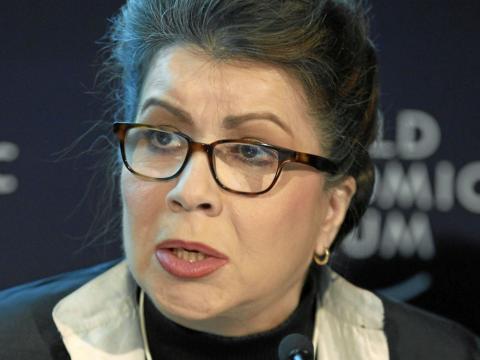By Mabinty M. Kamara
The World Bank Group Vice President and Chief Economist, Prof. Carmen Reinhart has called on African Leaders to rethink revenue mobilisation strategies and other fiscal policies as the impact of the Covid-19 pandemic continues to exacerbate debt stress levels across the continent.
She said most economies across the world, inclusive of several African countries, entered the pandemic when they were at high risk of or in debt distress levels occasioned by rising debts, slowing growth and weak financial conditions.
Prof. Reinhart was speaking during the Plenary Session of the African Economic Research Consortium (AERC) Biannual Research Workshop held under the theme "Covid-19 Pandemic and Public Finance in Africa: Challenges and Opportunities", on Monday 31st May 2021.
"The Covid-19 pandemic has exacerbated the challenges that existed before the pandemic, worsening the debt situation even further. The need to spend more on public health and social safety nets programmes coupled with a slowdown in economic activities are all exerting considerable pressure on government finances," Prof. Reinhart said. "Several governments across the continent are forced to run wide fiscal deficits that are slowly translating into increasing debt and debt distress. Covid has been an exceptionally regressive crisis. It's regressive within countries and regressive across countries," a press statement from the AERC quoted her saying.
According to the Chief Economist, the effect of the COVID-19 pandemic has forced various governments across the Africa continent to roll out various programmes to support the adversely impacted households, whilst financing its operations and public service. Unfortunately, she said many African countries have relatively high levels of debt and that means that they do not have enough fiscal resources to respond to the crisis and to help people, leading to debt stress levels.
"We are facing a more protracted downtime as conditions haven't normalised tourism, cross-border activities, and other key sectors of the economy. In Africa, the income per capita Gross Domestic Product (GDP) is not going to recover to its pre-crisis levels in 2021, thus the biggest challenge of avoiding debt looms very largely," she said.
Professor Reinhart therefore highlighted the need for debt restructuring and resource mobilisation by tackling fiscal problems through austerity measures, widening of the revenue base to help reduce the debt levels and finance social services amidst the pandemic. She also spoke about building safety nets through digital financial platforms to enable effective distribution of government benefits and climate financing by engaging green finance while tackling climate-related risks that have been accumulating over time, as policy priorities to consider, going forward.
In his statement, the AERC Executive Director, Prof. Njuguna Ndung'u said the pandemic has exposed the structural vulnerabilities of most African countries from health financing, health infrastructure, social safety nets, economic diversification, and public finance.
"The negative effects of the Covid-19 pandemic are visible in all the African regions, but most affected are in Southern and Western Africa," Prof. Ndung'u said. "Some African countries have fared better than others depending on their initial conditions. The countries that were already having debt distress fared even worse,” he added.
Due to the devastating impact of the pandemic, it is believed that African economies are witnessing the reversals in the gains made over the last 20 years in terms of poverty reduction and employment creation.
Across the continent, millions of people are going without jobs and cost of living has increased. Interestingly the pandemic has brought out the capacity of citizens to help each other. Private Citizens mobilize resources to uplift the poor, the needy, and to defray medical expenses for the sick.
"There's an opportunity to institute strong social protection programmes in Africa to ensure support for the poorest and cushion against those marginalised and future negative shocks- but dependent on fiscal space," he noted.
The 54th plenary session of the AERC Biannual Research Workshop set the context for deliberations on a broad range of issues including challenges and opportunities in reforming the state of public finance in Africa.
Established in 1988, African Economic Research Consortium is a premier capacity building institution in the advancement of research and training to inform economic policies in sub-Saharan Africa.
AERC’s mission rests on two premises: first, that development is more likely to occur where there is sustained sound management of the economy; second, that such management is more likely to happen where there is an active, well-informed cohort of locally-based professional economists to conduct policy-relevant research. AERC builds that cohort through a programme that has three primary components: research, training, and policy outreach. The organization integrates high-quality economic policy research, postgraduate training, and policy outreach within a vast network of researchers, universities, and policymakers across Africa and beyond.
Copyright © 2021 Politico Online








